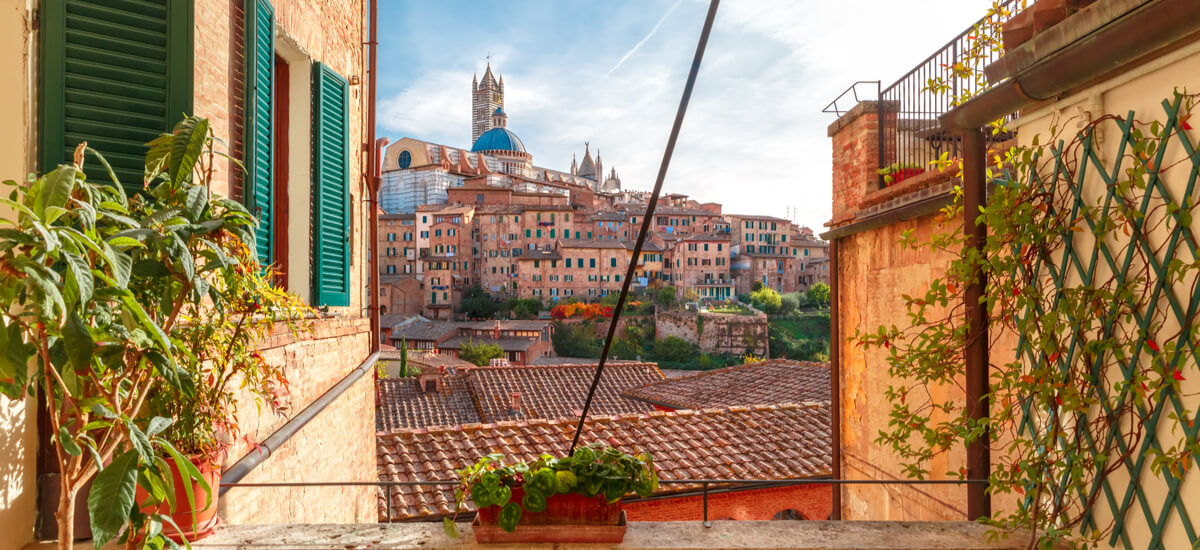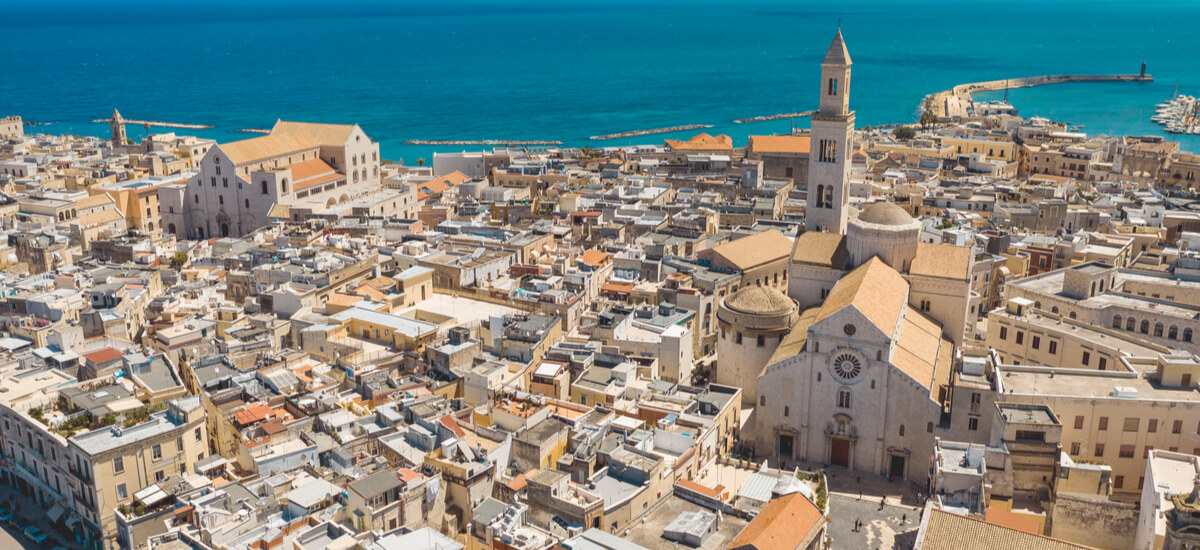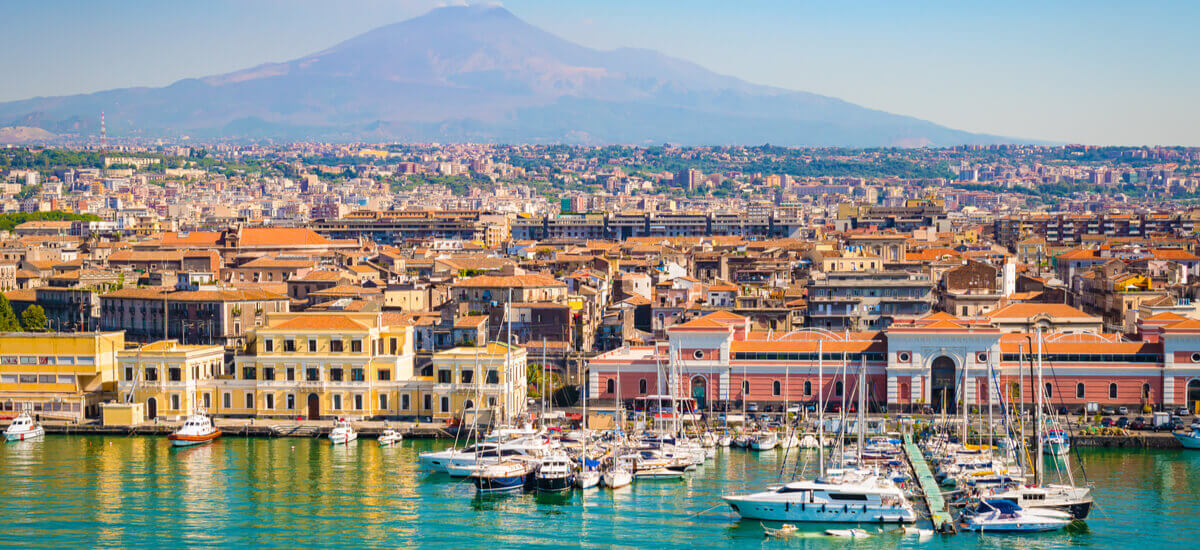How much is a security deposit? 2025 guide
Everything you need to know about security deposits

From history and culture, to food and wine, and an attractive Mediterranean climate, Italy has it all. Whether you want a vacation place in Venice or a new family home in Florence, moving to Italy is a dream for many Americans.
Before you plan your move to Milan (or Rome or Naples or anywhere in between) you need this guide.
We’ll walk through how buying a house in Italy as an American works, how to find a house for sale in Italy, and how to cut the costs of currency conversion when you send international payments with Wise.
| This article has been written in collaboration with Vincenzo Villamena, CPA and co-founder of Online Taxman. |
|---|
If you’re interested in houses for sale in Italy — or even looking for land for sale in Italy to build a property yourself — you’re not alone. In fact, Italy is now the number one location for North Americans to buy a second home overseas¹.
It’s not just the climate and cuisine which drives this popularity. Italian properties are on average significantly cheaper than the equivalents in Spain or Portugal — and can come with lower transaction costs when buying, and capital gains advantages when selling, too.
If you’re considering buying an investment property in Italy, you may even benefit from a government scheme which covers the costs of some renovations to improve energy efficiency — driving up the value of the home and making it more eco-friendly at the same time.
| Going abroad? Get a Wise account so you can |
|---|
|
Get your Wise account
in minutes 🌐
Now the big question: can I buy a house in Italy? The good news is that buying a house in Italy as an American is possible.
If you’re a US citizen you can buy property in Italy thanks to bilateral agreements between Italy and the US — often known as reciprocal agreements. This reciprocity means that because an Italian would be entitled to buy a property in the US without restrictions, Italy returns the favor and lets US citizens buy homes in Italy with the same privileges.
Buying a home doesn’t change the standard visa requirements to stay in Italy — but as a US citizen you’ll usually be OK to stay for up to 90 days without restrictions, making it a perfect place for a vacation home.
It’s worth knowing a bit about the local processes before you start buying a house in Italy yourself. Here’s an outline²:
Whether it’s from a home loan or mortgage, from your savings or through another route like HELOC (Home Equity Line of Credit)
| Find your way to getting an overseas property mortgage in our handy guide. |
|---|
Buying a property — especially overseas — will be far easier if you engage a realtor you trust. Ask around in the area you plan to buy to get recommendations, and look for customer reviews online to find someone who suits your needs.
You’ll be able to start viewing properties at this point. However, there are a few other important steps like getting a codice fiscale — like an SSN — and opening a bank account in Italy. You may also want to get local tax advice.
Once you’ve found the right place, your realtor will help you negotiate. You may use a purchase proposal (proposta di acquisto)
Your realtor and solicitor will now do a range of due diligence checks to make sure the property is being legally sold and confirm the details of the sale.
This can take a few weeks. Once you’re satisfied the last step is to sign the public deed of sale in front of a notary and alongside the seller. Pay your closing costs and taxes — and you’re done!
Buying a house in Italy as an American may be cheaper than choosing a property in Spain, Portugal or another European country — but you’ll still need a budget. Here’s the lowdown.
Italy offers a range of cities and towns, with properties for all types of budget. In the north of the country you can find larger and more populated areas — with large cities such as Milan or Rome — and consequently it’s where square feet price will cost you more.
In the south of the country you can find a range of villas, apartments and houses to make your dream of la dolce vita come true — and for much less than you’d pay in the north. Cities like Palermo and Naples are good options if you want to live close to the sea.
Below you can find a comparison to get you an overview of the average house prices in Italy by city:
| City | Cost in City Center (sqft) | Cost Outside of City Center (sqft) |
|---|---|---|
| Rome³ | 711.90 USD | 350.89 USD |
| Florence³ | 489.82 USD | 311.53 USD |
| Naples⁴ | 370.35 USD | 182.25 USD |
| Palermo⁴ | 203.06 USD | 116.97 USD |
| Milan⁵ | 804.64 USD | 371.79 USD |
| Bologna⁵ | 412.41 USD | 285.06 USD |
| Venice⁶ | 534.64 USD | 260.24 USD |
Another important aspect to look out for when setting your budget are the taxes and fees you’ll have to pay for your Italian home.
The seller will only cover one small part of the fees — 1.5% — 4% if the property price to pay for the realtor fees — which means that you’ll have to pay for the following:
| Type of fee | Amount (%)² |
|---|---|
| Registration tax |
|
| VAT |
|
| Real estate agent fees |
|
| Land registry tax |
|
| Notary fee |
|
| Legal fees |
|
| Exchange rate |
|
After reading up on the costs of purchasing property in Italy, you might be wondering how to send money to pay for it.
Wise offers you a quick, low-cost⁸ and secure way of sending money to Italy — in just a few clicks.
You’ll get the mid-market exchange rate and know upfront how much each transaction will cost. You can also create recurring payments, so you don’t have to worry about setting up a new transaction for your EUR expenses each month.
US citizens and Green Card holders are subject to US tax and reporting rules on their worldwide income and assets. This is true whether you live in the US or abroad.
If you do move to Italy, you may be liable to pay Italian taxes, too. A US expat tax specialist can advise you on the best strategies to avoid double taxation.
Purchasing or owning overseas property in your own name isn’t reportable under US rules, however there can still be US tax implications in certain situations.
For example, if you purchase a property through a corporation or other entity, the company entity will have annual US reporting obligations.
If you (or an entity you own a property through) received rental income from foreign real estate, you will have to report it as part of your US federal tax return.
You also have to report any non-US bank or other financial accounts you (or a company you own) hold abroad under FBAR and sometimes FATCA rules.
If you choose to sell your foreign real estate, you may be liable to US (as well as Italian) capital gains tax. Keep records of all your costs relating to the purchase and any improvements or renovations you make, as these may be deductible.
US taxes and reporting for Americans with international residence or assets is complex, and penalties for non-compliance can be high. For a streamlined process, seek advice from a US expat tax expert.
Quite a few towns in Italy have hit the headlines over the past few years, by offering homes for sale for just 1 EUR — about the same as a dollar⁷.
The properties available typically have been abandoned and need significant renovations. Part of the deal requires the buyers to pay a deposit, and renovate the home in the 3 years following purchase. However, depending on the location, you may be able to renovate the place as a home, or a business property, depending on your preference.
$1 homes in Italy are offered through municipal councils. Private owners give the municipality permission to sell, to help them avoid paying property tax. Buyers then apply directly to the municipal council in the area, to find out which properties are available and the exact purchase terms that apply.
It’s not necessarily a cheap way to get a property in Italy — more of a labor of love to breathe new life into a dilapidated home — but you could end up with a little piece of Italian history all for yourself.
Getting excited about the property of finding a house for sale in Italy? Here’s what you need to think about.
Here are some of the most popular regions and cities to buy a place in Italy.

Tuscany is probably the most popular region of Italy for people buying a second home, famous for its stunning scenery — and of course, its wine. If you’re looking for culture, history and art, Florence may be your perfect match.
Property prices are high and you’ll probably be looking at a relatively small apartment if you want to be in a good location. But in return you get access to all the history, art and culture you can handle.

With extensive coastline, pretty towns and great weather, the region of Puglia is a smart choice if you’re looking for an affordable country getaway. Just remember when choosing an older property to keep a special eye out for the condition of plumbing and electric, and the presence of asbestos and lead.
While all of these things can be easily hidden, they’re a bear to fix or get rid of once they become obvious.

The region where Turin is located is a good bet for anyone who loves to ski. However, it can also be a great summer destination for outdoors types, to enjoy hiking the trails and soaking in the sunshine.
Possibly best of all, properties in Turin are perennially popular with visitors, making a home there a potential source of income if you let it out when you’re not using it.

Sicily has a unique culture all of its own, with amazing beaches and historic towns. There are a good range of property types available here, too, from town center apartments to villas in the countryside which may even come with olive groves.
Spend some time immersed in the culture here, and tour around to find the perfect spot for your new Italian dream home.
For the most part, it’s advised to use an agent when looking for property in Italy. Most buyers contract an agent or lawyer in their home county, who then works with the Italian real estate agent.
It’s not uncommon for real estate agents to work in dual languages, and depending on where you live you may find a local agent who speaks Italian.
When it comes to getting started with your property research, here are some websites for you to turn to:
Buying property in an unfamiliar country can feel risky. Here are a few tips to consider:
|
While it can be difficult to read up on every scam that’s out there, a good rule of thumb is to go with your gut. If something seems fishy, it’s ok to pump the brakes.
Now you have all you need to know about how to buy property in Italy as a US citizen. This guide to getting a home or investment property in Italy should give you the framework to start your own research, and get a step closer to making your Italian dream a reality.
And don’t forget, whenever you need to send USD to EUR, Wise will be there to help with fast, secure and cheap international transfers.
 | This article has been written in collaboration with Vincenzo Villamena, CPA and co-founder of Online Taxman. Originally from Michigan, Vincenzo began his career at PwC before moving abroad in 2005. He founded Online Taxman to help other expats file and optimize their US taxes securely and easily from abroad. He currently resides in Brazil. Online Taxman now proudly serves US expats and international entrepreneurs in almost every country in the world. |
Sources checked on 02.21.2022
*Please see terms of use and product availability for your region or visit Wise fees and pricing for the most up to date pricing and fee information.
This publication is provided for general information purposes and does not constitute legal, tax or other professional advice from Wise Payments Limited or its subsidiaries and its affiliates, and it is not intended as a substitute for obtaining advice from a financial advisor or any other professional.
We make no representations, warranties or guarantees, whether expressed or implied, that the content in the publication is accurate, complete or up to date.

Everything you need to know about security deposits

Learn all about different ways to get an overseas property mortgage as an American and gain unique insights to prepare yourself for the whole process.

Get a full overview of the best property management software systems for small landlords to easily track and manage their overseas property.

How to buy your first rental property overseas? Here's a detailed guide that can help you understand the challenges and steps for making an investment.

What are the best property management software systems for managing student housing? Take a look at our list and choose the most suitable option for you.

Are you thinking about making smart property investment decisions and wondering how rental yield is calculated? Have a look at our guide to find out.